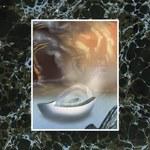
Wand Laughing Matter
(Drag City)
Wand's last album, Plum, ended with a soft lull on Driving—the expansive blues-rock finale culminated into a spiritual finish. It also left some uncertainty as to which direction the LA quintet would go next, given that they'd been gradually abandoning their garage-rock beginnings. The result of this change is rather explicit on Laughing Matter opener Scarecrow—groove-inflected psychedelia alongside a fluid, tempered atmosphere. The band's fifth full-length in five years continues to find new ways to further their craft, as they consider how to write more succinctly while equally expanding the album format.
Laughing Matter is easily Wand's longest album to date—they make no qualms about creating a vast, pastoral musical frame that takes its time to unwind. The acoustic-driven High Planes Drifter invites quiet contemplation, as lead singer Cory Hanson tells his flighty thoughts over an unsettling, shimmering drone. Otherwise, the band fully embrace their pop songwriting chops with surprising ease—from the Sea and Cake on steroids Thin Air to the tuneful, radio-worthy Walkie Talkie, Wand brim over textured, melodic guitar rock. Maybe not so much in today's genre-blurring rock landscape, but they'd fit in nicely alongside Supergrass and Radiohead on British radio back in the nineties.
The lurking sense of drift that Wand incorporates on Laughing Matter is both a strength and a weakness. While their no-holds-barred sonic assault of melodicism and experimentation reveal a knack for melodic complexity, there's also that nagging feeling that they could've trimmed some of the album's mammoth, jammy epics. Nevertheless, Wand is onto something here—it's commendable to hear them soar into bracing, Led Zeppelin folk-rock (Evening Star) while packing gleaming hooks with choruses (Xoxo, Wonder) with zestful exuberance. Their song-oriented approach recharacterizes a project that was once known for their simple, garage revivalism. Wand now rise above that notion—it's a refreshing move that makes it even harder to pin down their artistic evolution.
22 April, 2019 - 03:21 — Juan Edgardo Rodriguez